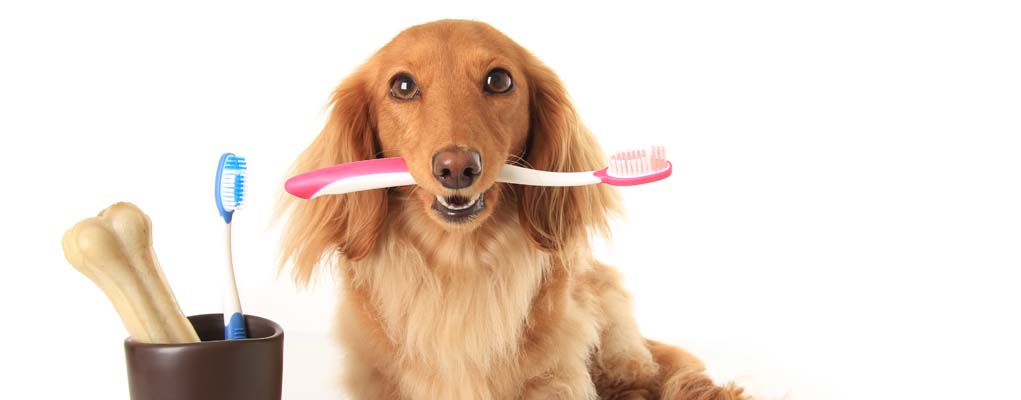
February is Pet Dental Health Month! Did you know that dental hygiene is one of the most overlooked areas in pet health? We want to support raising awareness to the importance of your dog’s oral health care. Every day we do things to keep our dogs safe, healthy and happy. One of the biggest things should include helping them with good oral health care. While dental issues are among the most common reasons we bring our pets into the veterinarian, they are difficult to treat. It’s easier to prevent than cure.
What Is Periodontal Disease
Periodontal disease begins with a collection of bacteria in the mouth that eventually migrates into the gums. Once the bacteria has spread to the gum line, it begins to spread and cause damage to the tissue and bone.
Why Dental Hygiene Is Important
Just like us, dental hygiene is important for our furry family members!
- Those chompers may not come close to smelling like roses, but healthy oral hygiene leads to better breath. Who likes bad breath?
- Not addressing your dog’s dental hygiene can lead up to plaque and tartar. Over time, this can lead to periodontal disease that results in bad breath, irritated and/or bleeding gums, pain, and tooth loss.
- Eating can become very painful. A loss of appetite and/or whimpering while your dog eats are signs they may be suffering from pain. This is a sign that’s associated with unhealthy teeth and gums.
- Facial swelling can occur as teeth rot and cause abscesses.
- Bacteria associated with tartar buildup and periodontal disease can be transferred to the bloodstream and easily lead to other health issues such as heart, kidney and liver disease.
Tips To Take Care of Your Dog’s Teeth
Dental Treats & Chews – Dog’s love to chew and it’s a natural behavior. They help fight tartar and plaque build-up, massaging their gums, help to alleviate bad breath, and improving their overall dental health. OraVet Dental Hygiene Chews for Dogs has worked wonders for our own dogs. This is also a great alternative to use between brushings.
Dental Chews – Dog’s love to chew and it’s a natural behavior. Find a chew toy
Use a pet-friendly toothbrush/toothpaste – You can purchase a toothbrush and toothpaste available for dogs at most pet stores. Dog toothbrushes have smaller bristles and a smaller head, some of them fit on your finger to help control the movement. Dog toothpaste is meant to be appealing and is safe to swallow. Do not use human toothpaste on dogs! It can easily upset their stomach and make them sick.
Dry food over wet food – There are many benefits to both wet and dry, however dry food can help with dental health because the hard texture works as its own toothbrush, lightly scraping and helping clean the teeth as your dog chews. Of course, if your dog already has difficulty and pain chewing kibble, wet food may be a better option.
Routine dental cleanings – Just like us, we aim to visit the dentist every six months for check-ups and cleanings. Making dental routine cleanings can help keep our dog’s teeth and gums stay healthy, increasing their quality of life.
How To Brush My Dog’s Teeth
If your dog isn’t use to having their teeth brushed, it’s okay…you’ll get there! It may take a little time for them to warm up to the idea and a little patience.
Step 1: Let your dog taste the toothpaste off the toothbrush. Next, you want your dog to be comfortable with their mouth being handled. Each time you touch their mouth or gently lift their lip, praise with a treat.
Step 2: Once comfortable with the sight of a toothbrush and their mouth being touched, combine the two by lifting their lip and bringing the toothbrush smeared with toothpaste to their teeth. Don’t try to brush just yet, let them get use to the idea of the brush touching their teeth and let them lick the toothpaste. It may take a few days of praise and patience.
Step 3: Gently brush your dog’s teeth moving to different areas of the mouth. Work on opening their mouth so you can brush the inside teeth too. Continue with lots of praise and treats as rewards. You want to create a positive experience so your dog knows getting their teeth brushed will earn them a special treat.
Note: This post is intended to promote the importance, understanding, and knowledge of good dental hygiene for our dogs. This is not intended to be a substitute for professional advice, diagnosis or treatment. You can always schedule an appointment with your veterinarian to seek their advice and answer any questions you may have regarding your dog’s dental health.
American Veterinary Dental Care https://www.avdc.org/carefordogs.html (accessed Jan. 22, 2019)
American Veterinary Medical Foundation https://www.avma.org/public/PetCare/Pages/Pet-Dental-Care.aspx (accessed Jan. 22, 2019)